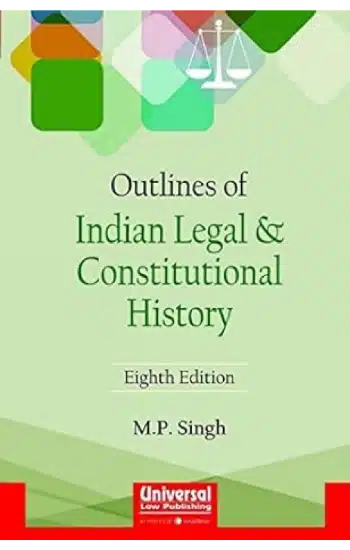
Save: 10%

Save: 10%
Outlines of Indian Legal and Constitutional History
Publisher:
| Author:
| Language:
| Format:
Publisher:
Author:
Language:
Format:
₹425 ₹382
Save: 10%
In stock
Ships within:
In stock
| Book Type |
|---|
ISBN:
Page Extent:
From the earliest times of their existence all societies have had law. This is a self-evident truth which requires no proof. No society, whether human or animal, can be conceived of without any norms for its organization and operation. While the biologists are engaged in understanding the laws of animal world wocial scientists, especially lawyers, have recorded from the very early times the laws that have regulated ro guided human activity within the society. Among them a class of legal thinkers in the eighteenth and nineteenth centuries has been categorized as historical jurists. From the historical evolution of law they have tried to propound certain universal propositions.
For example, Friedrich Carl von Savigny of Germany from his study of Roman and German laws drew the conclusion that laws are not made but found which evolve with a society like its language and the best source of law is custom and not legislation. Similarly Sir Henry Sumner Maine, the Law Member of the Governor-General’s Council in India from 1862 to 1869 is known for his several legal propositions of general application laid down among others in his Ancient Law (1861). He drew special attention to the legal developments in India, albeit his conclusions about law in India vis-a-vis the West were not encouraging to us.
Besides this category of legal thinkers legal historians around the world have traced the evolution of law in different societies from the beginning of those societies or as far in the past as the history of those societies goes. Definitely the laws in the beginning of the societies were as simple and rudimentary as were the societies. Laws have grown with the growth of the societies. This evolutionary process establishes evident relationship between law and society that as the society changes laws also change even though law has also been an instrument of social change.
From the earliest times of their existence all societies have had law. This is a self-evident truth which requires no proof. No society, whether human or animal, can be conceived of without any norms for its organization and operation. While the biologists are engaged in understanding the laws of animal world wocial scientists, especially lawyers, have recorded from the very early times the laws that have regulated ro guided human activity within the society. Among them a class of legal thinkers in the eighteenth and nineteenth centuries has been categorized as historical jurists. From the historical evolution of law they have tried to propound certain universal propositions.
For example, Friedrich Carl von Savigny of Germany from his study of Roman and German laws drew the conclusion that laws are not made but found which evolve with a society like its language and the best source of law is custom and not legislation. Similarly Sir Henry Sumner Maine, the Law Member of the Governor-General’s Council in India from 1862 to 1869 is known for his several legal propositions of general application laid down among others in his Ancient Law (1861). He drew special attention to the legal developments in India, albeit his conclusions about law in India vis-a-vis the West were not encouraging to us.
Besides this category of legal thinkers legal historians around the world have traced the evolution of law in different societies from the beginning of those societies or as far in the past as the history of those societies goes. Definitely the laws in the beginning of the societies were as simple and rudimentary as were the societies. Laws have grown with the growth of the societies. This evolutionary process establishes evident relationship between law and society that as the society changes laws also change even though law has also been an instrument of social change.
About Author
Reviews
There are no reviews yet.
Related products
The Framing of India’s Constitution (In 6 Volumes)
Save: 20%
Environmental Law and Policy in India: Cases and Materials
Save: 15%
RELATED PRODUCTS
Environmental Law and Policy in India: Cases and Materials
Save: 15%
Commercial’s New Labour & Industrial Code – 2021/edition
Save: 10%
COMPETITION LAW TODAY 2Ed: Concepts, Issues, and the Law in Practice
Save: 10%
Handbook for Independent Director’s Examination (With MCQs) – 2nd edition
Save: 10%
Taxmann’s Corporate Laws (Set of 2 volumes) – 46th Edition
Save: 10%
The Framing of India’s Constitution (In 6 Volumes)
Save: 20%



Reviews
There are no reviews yet.